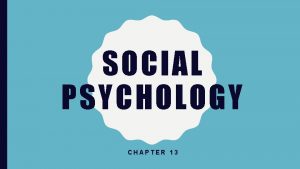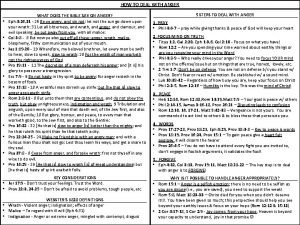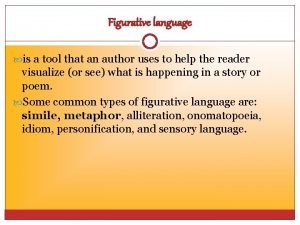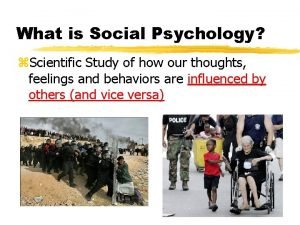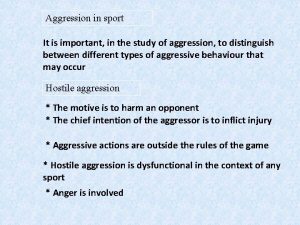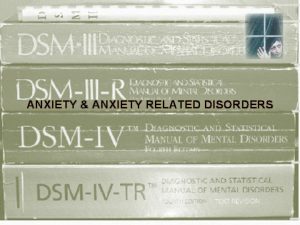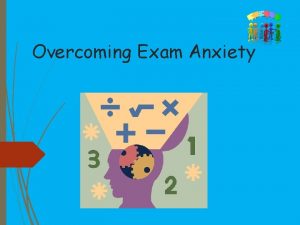Frustration Anxiety Tension Welcome to F A T
















- Slides: 16

Frustration. Anxiety. Tension. Welcome to F. A. T. City! A Presentation by Katy Angelone and Kristin Capezio on the work of Richard Lavoie

Frustration, Anxiety, Tension These 3 feelings are at the forefront of a Learning Disabled student’s negative experiences at school. LD students are twice as likely to experience FAT in social and academic engagements than students without an LD (Lavoie, 2010).

Deficit Model Thinking (Valencia, 2006) • LD students are often exposed to hearing themselves described in terms of what they cannot do/don’t have. • Routinely defining students by what they can’t do skews judgment re what a student is capable of, reducing performance expectations. • This can cause a perseveration on less critical skills the teacher expects to change or influence.

• When the LD student is concerned he/she does not have the skills to perform the task, without listening to the instructions, he/she will defer to I DON’T KNOW statements. This can happen on repeat. • LD students will refuse to make eye contact hoping avoidance will be interpreted as invisibility. • The LD student may be disruptive or try to distract the teacher and receive negative attention rather than expose his/her academic weakness or deficit.

When the pace of class is too fast an LD student will not hear or process everything and miss steps the teacher may attribute inattention, laziness or indifference. An LD student will develop behaviors that appear “on” to the untrained eye such as false scanning and nodding. LDs will likely NOT take social or academic risks if they perceive the failure will be public. (ie. reading aloud, spelling bees, or joining a new game).

Challenges with Social Integration (Lavoie, 2010) Confusion with Common Forms of Humor • Sarcasm, Irony, Tongue and Cheek, Exaggerations, and Innuendo can go over students’ heads and seem to benefit only those in the “know”

5 Parts of Language Development • • • Phonology--understanding of speech sounds that comprise a language Morphology—understanding of the forms words take and that meaning changes with word adaptations: pre, post, re-, de-, -ing Syntax—understanding of the rules of arrangement of words to create coherent sentences and phrases. Semantic—meaning or sense-making from sentences and phrases. Contextual and conceptual understandings. Pragmatics—conversation, means of meeting basic needs, articulating requests, transactional language

Language-Based Difficulties Some students suffer from disnomia and dyslexia where they cannot find the correct words, or they invert letters in parts of words or the order of words entirely. This is heightened in high stress or high anxiety circumstances only making the problem worse for the student. List Some of the Most Commonly Mis. Said Words: Allocates-Accolades Describe-Prescribe Probably-Properly (Lavoie, 1990).

Understanding Meaning Through Context • Johnny ______ me when I was ______ and I choked. I still don’t feel ______ and he didn’t _____. • Mary went to the ______ at Sistan’s house and had a ______ time and I didn’t go because I wasn’t invited. • Emily’s dogs died yesterday and she said her mother was _____ about their _______. I have a dog. Could that _______ to me? • I accidentally _________ into Max and I want to _________ but he walked away and now he won’t _______ with me. I’m sorry. I said I’m sorry. Try This: How Many Answers Can You Come Up With?

If you think that was easy, try this: I’ve got a pill dickle. You that read wrong, too Normal reading requires a certain level of decoding, sounding out, and correct blending of sounds. Once the brain has been practicing for some time, it decodes and even rearranges words to make sense based on the learned rules of that language without any extra effort. The brain works for you in making sense of language order but you need the foundation, or the basic skills to be able to do that automatically. For many LD students, these skills are very hard to build.



Empathic Interventions • Ask the child questions you know he/she can answer. Help him/her build classroom participation confidence. • Positively acknowledge correct answers but also share an appreciation for creative wrong answers. • Set up a private cue so the student knows when he/she will be called upon. • Create a setting where there are no physical set backs to increase student anxiety. • Give student information early on the next day’s class work. Talk to parents about tomorrow.

o Help diversify I DON’T KNOW statements into positive self-talks and action plans. “I’m working on it. ” (Dweck, 2008). o Do not force eye contact in front of peers if LD student is deliberately averting. o Examine the root of misbehavior (such as fear or anxiety about a situation) before delving into consequences. o Individualize reward plans.

WANT TO UNDERSTAND? Pick up a ball and toss it in the air just above your head. Pick a category and say as many nouns within a chosen topic as you can until you catch the ball at your waist; try to meet a minimum of 5. They don’t have to make sense. Test yourself. Lets say: Wild Cats, Water Polo, Car Mechanics. Can you say 5 words off the top of your head before the ball falls? This is an LD student trying to join a conversation where his/her content knowledge, vocabulary and focus is fractured.

Take it a Step Further…Turn & Talk Next, start to pare down on the number of words you can say regarding any one topic: now you can’t use single syllable words, or words can’t contain the SH sound or, you’re no longer able to apply –ly or –ing. This is what conversation can feel like to the LD student, all the while the ball, or window of opportunity to socially engage with classmates, is closing just as quickly as it opened.
 Frustration anxiety and tension
Frustration anxiety and tension High surface tension vs low surface tension
High surface tension vs low surface tension Transference definition
Transference definition Rumus tegangan permukaan air
Rumus tegangan permukaan air Aggression im sport definition
Aggression im sport definition Chronic frustration
Chronic frustration Ap psychology unit 14
Ap psychology unit 14 Magnetic frustration
Magnetic frustration Davis contractors v fareham udc
Davis contractors v fareham udc Psychology experiment
Psychology experiment How to deal with frustration
How to deal with frustration Cognitive neoassociation
Cognitive neoassociation What can trigger spectator aggression in sport
What can trigger spectator aggression in sport Similes for frustration
Similes for frustration Self fulfilling prophecy example
Self fulfilling prophecy example Frustration aggression theory in sport
Frustration aggression theory in sport Wise men three clever are we
Wise men three clever are we









